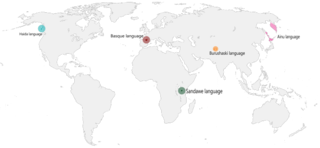Related Research Articles

The Northeast Caucasian languages, also called East Caucasian, Nakh-Daghestani or Vainakh-Daghestani, is a family of languages spoken in the Russian republics of Dagestan, Chechnya and Ingushetia and in Northern Azerbaijan as well as in diaspora populations in Western Europe and the Middle East. They are occasionally called Caspian, as opposed to Pontic for the Northwest Caucasian languages.

Language isolates are languages that cannot be classified into larger language families. Basque in Europe, Ainu in Asia, Sandawe in Africa, and Haida in North America, are all examples of language isolates. The number of language isolates is unknown.

Abkhaz, sometimes spelled Abxaz and also known as Abkhazian, is a Northwest Caucasian language most closely related to Abaza. It is spoken mostly by the Abkhaz people. It is one of the official languages of Abkhazia, where around 100,000 people speak it. Furthermore, it is spoken by thousands of members of the Abkhazian diaspora in Turkey, Georgia's autonomous republic of Adjara, Syria, Jordan, and several Western countries. 27 October is the day of the Abkhazian language in Georgia.

The fifteen Katuic languages form a branch of the Austroasiatic languages spoken by about 1.3 million people in Southeast Asia. People who speak Katuic languages are called the Katuic peoples. Paul Sidwell is the leading specialist on the Katuic languages. He notes that Austroasiatic/Mon–Khmer languages are lexically more similar to Katuic and Bahnaric the closer they are geographically. He says this geographic similarity is independent of which branch of the family each language belongs to. He also says Katuic and Bahnaric do not have any shared innovations, so they do not form a single branch of the Austroasiatic family, but form separate branches.

Rajasthani refers to a group of Indo-Aryan languages and dialects spoken primarily in the state of Rajasthan and adjacent areas of Haryana, Gujarat, and Madhya Pradesh in India. There are also speakers in the Pakistani provinces of Punjab and Sindh.
The Khasic or Khasian languages are a family of Austroasiatic languages spoken in the northeastern Indian state Meghalaya and neighbouring areas of Bangladesh.
Terence Michael Crowley was a linguist specializing in Oceanic languages as well as Bislama, the English-lexified Creole recognized as a national language in Vanuatu. From 1991 he taught in New Zealand. Previously, he was with the Pacific Languages Unit of the University of the South Pacific in Vanuatu (1983–90) and with the Department of Language and Literature at the University of Papua New Guinea (1979–83).
The Ndu languages are the best known family of the Sepik languages of East Sepik Province in northern Papua New Guinea. Ndu is the word for 'man' in the languages that make up this group. The languages were first identified as a related family by Kirschbaum in 1922.

Luciano Canepari is an Italian linguist. Canepari is a professor in the Department of Linguistics at the University of Venice, where he received his academic training.
The Aroid or Ari-Banna languages possibly belong to the Afro-Asiatic family and are spoken in Ethiopia.
Martin Haspelmath is a German linguist working in the field of linguistic typology. He is a researcher at the Max Planck Institute for Evolutionary Anthropology in Leipzig, where he worked from 1998 to 2015 and again since 2020. Between 2015 and 2020, he worked at the Max Planck Institute for the Science of Human History. He is also an honorary professor of linguistics at the University of Leipzig.

In linguistic morphology, inflection is a process of word formation in which a word is modified to express different grammatical categories such as tense, case, voice, aspect, person, number, gender, mood, animacy, and definiteness. The inflection of verbs is called conjugation, and one can refer to the inflection of nouns, adjectives, adverbs, pronouns, determiners, participles, prepositions and postpositions, numerals, articles, etc., as declension.

Hristo (Slavov) Kyuchukov or Christo Slavov Kütchukov is a German Muslim Rom, born in Bulgaria. He is a leading specialist in the field of Romani language and education of Roma children in Europe.

Iatmul is the language of the Iatmul people, spoken around the Sepik River in the East Sepik Province, northern Papua New Guinea. The Iatmul, however, do not refer to their language by the term Iatmul, but call it gepmakudi.
Dusner is a language spoken in the village of Dusner in the province of West Papua, Indonesia. Dusner is highly endangered, and has been reported to have just three remaining speakers.
Susanne Maria Michaelis is a specialist in creole linguistics who is affiliated with the Max Planck Institute for Evolutionary Anthropology in Leipzig. She was previously at Leipzig University and at the Max Planck Institute for the Science of Human History in Jena.
The Angkuic languages are spoken in Yunnan province, China and Shan State, Burma.
Dr. Ulrike Mosel is a professor of linguistics and head of the linguistics department at the University of Kiel. She has held these positions since 1995. Mosel is the co-editor and author of nine academic books, including Essentials of Language Documentation with Jost Gippert and Nikolaus Himmelmann. This book is as described as "a landmark" in the field of Language Documentation.

Paul James Sidwell is an Australian linguist based in Canberra, Australia who has held research and lecturing positions at the Australian National University. Sidwell, who is also an expert and consultant in forensic linguistics, is most notable for his work on the historical linguistics of the Austroasiatic language family, and has published reconstructions of the Bahnaric, Katuic, Palaungic, Khasic, and Nicobaric proto-languages. Sidwell is currently the President of the Southeast Asian Linguistics Society (SEALS) and also regularly organises the International Conference on Austroasiatic Linguistics (ICAAL).
References
- Jendraschek, Gerd. 2001. Semantic and structural properties of Turkish ideophones. Turkic Languages 5: 88–103.
- Jendraschek, Gerd. 2002. The struggle against monolingualism. Journal of Universal Language 3:55-75.
- Jendraschek, Gerd. 2002. Semantische Eigenschaften von Ideophonen im Türkischen. München: LINCOM Europa (Edition Linguistik, 30).
- Jendraschek, Gerd. 2003. La modalité épistémique en basque. München: LINCOM Europa (LINCOM Studies in Basque Linguistics, 05).
- Jendraschek, Gerd. 2007. Basque in contact with Romance languages. In Alexandra Y. Aikhenvald and R.M.W. Dixon (Eds.), Grammars in Contact. A Cross-Linguistic Typology. Oxford: Oxford University Press.
- Jendraschek, Gerd. 2007. La notion modale de possibilité en basque. Morphologie, syntaxe, sémantique, variations diachronique et sociolinguistique. Paris: L’Harmattan.
- Jendraschek, Gerd. 2009. Origin and development of the Iatmul focus construction: Subordination, desubordination, resubordination. Folia Linguistica 43.2: 345–390.
- Jendraschek, Gerd. 2011. A fresh look at the tense-aspect system of Turkish. Language Research 47.2: 245–270.
- Jendraschek, Gerd. 2012. From polyfusional to post-fusional: Obsolescence and innovation in Basque predicate morphosyntax and its typological implications. Rice Working Papers in Linguistics 3: 1-33.
- Jendraschek, Gerd. 2014. Future tense, prospective aspect, and irrealis mood as part of the situation perspective: Insights from Basque, Turkish, and Papuan. In Philippe De Brabanter, Mikhail Kissine and Saghie Sharifzadeh (Eds.), Future times, future tenses. Oxford: Oxford University Press (Oxford Studies of Time in Language and Thought); 138–164.